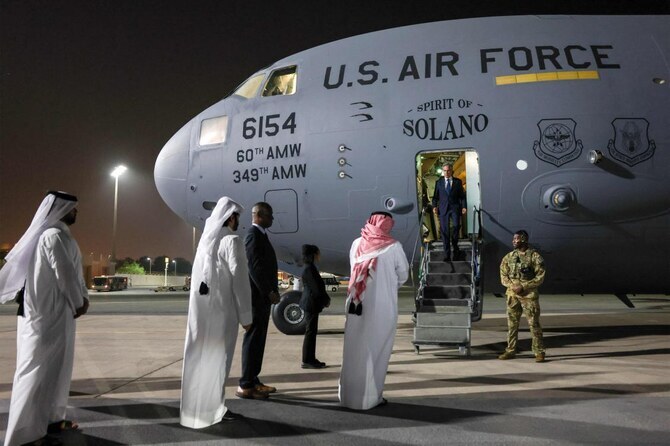DOHA: Top US diplomat Antony Blinken said Tuesday that “time is of the essence” to secure a Gaza truce as he wrapped up a Middle East tour with a plea for a deal.
The US secretary of state, on his ninth regional visit since the 10-month-old Israel-Hamas war began, made a brief stop in mediator Qatar but was unable to meet its emir.
Speaking on the tarmac in Doha before heading back to Washington, Blinken reiterated his call for Hamas to accept a “bridging proposal” for a deal, which he said Israel had accepted, and asked both parties to work toward finalizing it.
“This needs to get done, and it needs to get done in the days ahead, and we will do everything possible to get it across the finish line,” he said.
Palestinian militant group Hamas, whose October 7 attack triggered the war, said it was “keen to reach a ceasefire” agreement but protested “new conditions” from Israel in the latest US proposal.
Earlier Tuesday, Blinken flew from Israel to Egypt for talks with President Abdel Fattah El-Sisi, who told him that “the time has come to end the ongoing war,” according to an official Egyptian statement.
El-Sisi warned of the consequences of “the conflict expanding regionally,” it said.
Blinken then traveled to Doha to meet with Emir Sheikh Tamim bin Hamad Al-Thani, though a US official said the Qatari ruler was feeling unwell and the two will instead talk on the phone soon.
Mohammed bin Abdulaziz bin Saleh Al-Khulaifi, minister of state at the Qatari foreign ministry, met with Blinken to discuss “joint mediation efforts to end the war,” Doha said.
Both Egypt and Qatar are working alongside the United States to broker a truce, which diplomats say would help avert a wider conflagration that could draw in Iran and Hezbollah in Lebanon.
Israel and Hamas have blamed each other for delays in reaching an accord that would stop the fighting, free Israeli hostages and allow vital humanitarian aid into the besieged Palestinian territory.
Medics and civil defense rescuers in the Hamas-ruled Gaza Strip said Israeli bombardment on Tuesday killed more than two dozen people, and Israel announced it had recovered the bodies of six hostages.
Mediators met last week with Israeli negotiators in Doha, and more truce talks are expected in Egypt this week.
One of the main sticking points has been Hamas’s long-standing demand for a “complete” withdrawal of Israeli troops from all parts of Gaza, which Israel has rejected.
Israeli media quoted Prime Minister Benjamin Netanyahu as saying Israel would insist on maintaining control of a strategic strip on the Gaza-Egypt border, known as the Philadelphi corridor.
A US official traveling with Blinken, speaking on condition of anonymity to discuss sensitive matters, said that “maximalist statements like this are not constructive to getting a ceasefire deal across the finish line.”
In Doha, Blinken said Washington opposes “any long-term occupation of Gaza by Israel.”
Fears of a regional escalation have mounted since Hezbollah and Iran vowed to respond after an attack last month, blamed on Israel, killed Hamas political leader Ismail Haniyeh in Tehran, shortly after an Israeli strike on Beirut killed a top Hezbollah commander.
Lebanon’s health ministry said four people were killed in Israeli strikes on Tuesday and Hezbollah claimed a string of attacks on Israeli troops, in the latest of the cross-border exchanges which have raged almost daily since the Gaza war began.
Hamas had called on the mediators to implement a framework set out by US President Joe Biden in late May, rather than hold more negotiations.
The Biden plan would freeze fighting for an initial six weeks while Israeli hostages are exchanged for Palestinian prisoners in Israeli jails and humanitarian aid enters Gaza.
Hamas said on Sunday that the current US proposal, which Washington had put forward after two days of meetings in Doha, “responds to Netanyahu’s conditions.”
And on Monday, in response to comments by Biden that it was “backing away” from a deal, the Iran-backed group said the “misleading claims... do not reflect the true position of the movement, which is keen to reach a ceasefire.”
Hamas officials as well as some analysts and critics in Israel have accused Netanyahu of prolonging the war for political gain.
The October 7 attack on southern Israel resulted in the deaths of 1,199 people, mostly civilians, according to an AFP tally of Israeli official figures.
Israel’s retaliatory offensive in Gaza has killed at least 40,173 people, according to the territory’s health ministry, which does not give details of civilian and militant deaths.
Most of the dead are women and children, according to the UN human rights office.
Out of 251 hostages seized during the attack, 105 are still held in Gaza, including 34 the Israeli military says are dead.
Israeli army operations in Gaza have continued throughout the truce talks.
An Israeli strike on Tuesday hit a school in Gaza City where the civil defense agency said at least 12 Palestinians were killed and the military said a Hamas command center was based.
Thousands of displaced Palestinians had sought refuge in the facility, civil defense spokesman Mahmud Bassal said.
AFP photos showed the Mustafa Hafiz school partly reduced to rubble, with Palestinians fleeing.
Elsewhere in Gaza, Bassal and medical sources reported at least 17 killed in four separate strikes.
The Israeli military said forces had retrieved the bodies of six hostages from a tunnel in the southern Gaza district of Khan Yunis.
The United Nations said parts of a north-south Gaza road that is “a crucial passage for humanitarian missions were included in the latest evacuation order” issued by the Israeli military on Saturday.
“This has made it nearly impossible for aid workers to move along this key route,” a UN statement said, preventing “critical supplies and services, such as water trucking” from reaching those in need.
Blinken wraps up Middle East tour with Gaza truce plea
https://arab.news/z6rsw
Blinken wraps up Middle East tour with Gaza truce plea

- Blinken met earlier in the day in Cairo with Egypt’s President Abdel-Fattah El-Sisi
- Top diplomat’s visit to the region also included meetings in Israel on Monday
White House says Yemen’s Houthi movement designated as ‘foreign terrorist organization’

- The Houthis’ activities threaten the security of American civilians and personnel in the Middle East, the White House says
WASHINGTON: US President Donald Trump on Wednesday designated Yemen’s Houthi movement, known formally as Ansar Allah, as a “foreign terrorist organization,” the White House said in a statement.
The move imposes harsher penalties than the Biden administration had applied to the Iran-aligned group in response to its attacks on commercial shipping in the Red Sea and against US warships defending the critical maritime chokepoint.
“The Houthis’ activities threaten the security of American civilians and personnel in the Middle East, the safety of our closest regional partners, and the stability of global maritime trade,” the White House said in a statement.
US policy, it said, would be to work with regional partners “to eliminate Ansar Allah’s capabilities and operations, deprive it of resources, and thereby end its attacks on US personnel and civilians, US partners, and maritime shipping in the Red Sea.”
Israel military says killed Islamic Jihad militant during Gaza truce

- The military said Israeli troops in southern Gaza “identified several armed suspects who posed a threat” and “operated to thwart the threat and eliminate” a militant
- It also said that in several areas of the Gaza Strip, its soldiers “fired warning shots“
JERUSALEM: The Israeli military said Wednesday that it killed an Islamic Jihad militant in southern Gaza, the first such reported death since the start of a ceasefire with Hamas in the Palestinian territory.
In a statement, the military said Israeli troops in southern Gaza “identified several armed suspects who posed a threat” and “operated to thwart the threat and eliminate” a militant from Hamas ally Islamic Jihad.
It also said that in several areas of the Gaza Strip, its soldiers “fired warning shots” toward “masked suspects” approaching Israeli troops.
The military added it was abiding by the terms of the ceasefire that began on Sunday.
“The (Israeli military) is determined to fully maintain the terms of the agreement in order to return the hostages,” it said.
As part of the first phase of the ceasefire, which is intended to last 42 days, Israeli forces are withdrawing from densely populated areas in the Gaza Strip.
The military warned Palestinians to “avoid approaching the troops.”
Simmering anger as Turkiye buries ski hotel fire victims

- The fire, which began in the middle of the night, struck at peak season for the hotel, with 238 guests staying for the winter school holidays which began on Friday
KARTALKAYA, Turkiye: Anger was growing in Turkiye on Wednesday as allegations piled up that negligence played a role in the deaths of 79 people who perished when a huge fire swept through a luxury ski resort hotel in northern Turkiye.
With the nation observing a day of mourning, grieving families began burying their dead as questions multiplied about fire safety measures at the 12-story Grand Kartal Hotel perched on a mountaintop in the Kartalkaya resort.
Front pages, including those of the pro-government dailies, were plastered with allegations of negligence which they blamed for the shocking death toll.
On a freezing foggy morning, with flags flying at half-mast, 12 of the 51 injured were still in hospital, including one in intensive care.
“There is no excuse for such a high number of deaths in 2025,” Ozgur Ozel, leader of the main opposition CHP party, said outside the blackened facade of the hotel where rescuers were combing through the ruins on Wednesday.
The fire, which began in the middle of the night, struck at peak season for the hotel, with 238 guests staying for the winter school holidays which began on Friday.
At a funeral in the nearby town of Bolu for eight members of the same family who died in the blaze, President Recep Tayyip Erdogan could be seen wiping away tears, his head bowed.
“When I got to the hotel, there were flames everywhere and we could hear screams,” said Cevdet Can, who runs a nearby ski school.
“I saw one person jump out of the window” to her death, Can told AFP, adding that it was seeing children trapped “that upset me most.”
Another ski instructor who escaped the hotel unharmed said he was unable to rescue his pupils, the youngest of whom was six.
“I lost five of my students who were staying on the sixth and seventh floors,” 58-year-old Necmi Kepcetutan told AFP, adding that another colleague had jumped to her death.
The blaze broke out around 3:30 am (0030 GMT), sparking panic among the guests, many of whom tried to climb out of the windows, using bedsheets as ropes.
Some fell to their deaths, media reports said.
Speaking to Turkish media outlets, many survivors told the same story: that there were no alarms warning them about the fire, no fire doors, and no safe ways for people to exit the hotel.
Tourism Minister Nuri Ersoy on Tuesday said that the hotel had passed an inspection last year and had two fire escapes, saying “no issues related to fire safety had been flagged by the fire department.”
A rescuer with the national catastrophe management agency Afad told AFP on condition of anonymity that “I saw fire escapes, but I suggest comparing this hotel’s fire escapes to those at nearby hotels. In the end, experts will decide.”
So far, 11 people have been arrested, among them the hotel’s owner, general manager, director and chief electrician, as well as the chief of Bolu’s fire department, the justice ministry told AFP.
The hotel’s management has presented its condolences and said it would cooperate with authorities to “shed full light on this accident.”
Situated at one of the most expensive ski resorts in Turkiye, the hotel boasted a prestigious client list that included executives, entrepreneurs and well-known doctors, many of whom were there with their children and family members.
By Wednesday afternoon, more than 20 victims had yet to be identified.
To secure Gaza ceasefire, dealmakers overcame enemies’ deep distrust

- The deal calls for Israel and Hamas to resume talks just over a week from now, to work out the second phase. That is supposed to include the release of all remaining hostages, living and dead, and a permanent ceasefire
Inside a lavish clubhouse on Doha’s waterfront, tensions strained by months of fruitless back-and-forth weighed on negotiators as the hour neared 3 a.m.
On the first floor, a Hamas delegation whose leader had once evaded an Israeli airstrike that killed seven family members combed through the details of yet another proposal to halt the war in Gaza. On the second floor, advisers to Israel’s intelligence chief, who had vowed to hunt down those responsible for the Oct. 7, 2023, attack that ignited the war, did the same.
With Qatari, US and Egyptian mediators pushing for resolution, did the sides — such bitter enemies that they refused to speak directly to one another — at last have a deal to pause the fighting and bring dozens of Israeli hostages home?
“They were extremely suspicious toward each other. No trust at all,” said an Egyptian official involved in the negotiations, who spoke on condition of anonymity. The talks that night a week ago dragged on over disagreements about maps showing where Israel would begin withdrawing troops and its demand that Hamas provide a list of hostages who remained alive, he said.
“Both parties were looking at each word in the deal as a trap.”
By the time Qatar’s prime minister, Sheikh Mohammed bin Abdulrahman Al Thani, announced a ceasefire deal last Wednesday evening, mediators had scrambled again to defuse objections by both sides. Even then, disagreements and delays continued over the two days that followed.
But as the fighting in Gaza paused this week, three young Israeli women were released from captivity and dozens of Palestinian prisoners were freed by Israel, the agreement, however tenuous, has held.
After months of deadlock, a singular moment for dealmaking
The story of how Israel and Hamas found their way to a deal stretches back over more than a year. But the timing and unlikely partners who coalesced to push negotiations across the line help explain why it finally happened now.
“Over the course of the last week all of the stars aligned finally in a way that, after 15 months of carnage and bloodshed, negotiations came to fruition,” said Mehran Kamrava, a professor of government at Georgetown University in Qatar.
The agreement was the product of a singular political moment, with one US president preparing to hand power to another.
Both were pushing for a deal to free some 100 Israeli hostages and bring an end to a conflict that began with the killing of about 1,200 in Israel and that Palestinian health officials say has killed more than 47,000 in Gaza.
The health officials do not distinguish between civilians and militants, but say more than half of those killed were women and children.
In tiny but wealthy Qatar, the talks had a steward that positions itself as a go-between in a region on edge, one that hosts the largest US military base in the Middle East even as it provides offices for leaders of Hamas and the Taliban. Egypt, eager to ease instability that has driven an influx of Palestinians across its border and sparked attacks on sea lanes by Houthi rebels, worked to keep the talks on track.
The circumstances partnered Sheikh Mohammed with improbable allies. Then-President Joe Biden sent Brett McGurk, a veteran Middle East hand in both Republican and Democratic administrations. Donald Trump dispatched Steve Witkoff, a Bronx-born real estate billionaire with little if any diplomatic experience, but a longtime friendship with the then-president-elect.
The deal they brought together calls for continued negotiations that could be even more fraught, but with the potential to release the remaining hostages and end a war that has destroyed much of Gaza and roiled the entire region.
Pressure mounted on Israel and Hamas
In the end, negotiators got it done in a matter of days. But it followed months of deadlock over the number of Israeli hostages that would be freed, the number of Palestinian prisoners to be released and the parameters of a pullback by Israeli troops in the embattled enclave.
In late May, Biden laid out a proposed deal, which he said had come from Israel. It drew heavily on language and concepts hammered out with Qatari and Egyptian mediators, calling for a phased agreement with continued negotiation toward a “sustainable calm” – verbiage designed to satisfy both sides.
But talks had stalled even before the detonation of a bomb, attributed to Israel, in late July killed Ismail Haniyeh, the head of Hamas’ political bureau. And efforts by mediators to restart them were derailed when Israeli forces found the bodies of six hostages in a Gaza tunnel in August.
“Whoever murders hostages does not want a deal,” Israeli Prime Minister Netanyahu said.
Pressure on Hamas increased after Israeli forces killed leader Yahya Sinwar — an architect of the Oct. 7 attack — and launched a devastating offensive against Lebanon’s Hezbollah, the group’s longtime ally.
But Qatari officials, frustrated by the lack of progress, announced they were suspending mediation until both sides demonstrated willingness to negotiate.
Weeks later, Trump dispatched Witkoff, a golfing buddy whose most notable prior link to the Middle East was his $623 million sale of New York’s Park Lane Hotel to Qatar’s sovereign wealth fund in 2023.
Flying to Doha in late November, Witkoff asked mediators to lay out the problems undermining the talks, then continued on to meet officials in Israel. The talks restarted soon after, gaining ground through December.
“Witkoff and McGurk were pushing the Israelis. Qatar was pushing Hamas,” said an official briefed on the talks who spoke on condition of anonymity.
Cooperation between Biden and Trump advisers was key
Assigning credit for the progress depends on viewpoint.
The Egyptian official recounted the frustration of successfully pushing Hamas to agree to changes last summer, only to find Netanyahu imposing new conditions.
An Israeli official who spoke on condition of anonymity last week because the negotiations were ongoing said Sinwar’s death and Iran’s weakening influence in the region forced Hamas’ hand, leading to real give-and-take rather than “playing a game of negotiation.”
He and others close to the process said Trump’s rhetoric and dispatch of an envoy had injected new momentum. The Egyptian official pointed to a statement by Trump on social media that there would be “hell to pay” if the hostages were not released, saying it had pressured both Hamas and Israeli officials to get a deal done.
And mediators said the willingness of Witkoff and McGurk — representing leaders loathe to give one another credit for the deal – to partner up was critical.
“How they have handled this as a team since the election, without yet being in office, has really helped close the gaps that allowed us to reach a deal,” Majed Al Ansari, the adviser to Qatar’s prime minister and spokesperson for the Ministry of Foreign Affairs, said in a statement.
In early January, there was a breakthrough in the talks when Hamas agreed to provide a list of hostages it would release in the first phase of a deal, an official briefed on the talks said.
McGurk flew from Washington to Doha hours later. Witkoff followed at week’s end.
The following day – Saturday, January 11 – Witkoff flew to Israel, securing a meeting with Netanyahu even though it was the Jewish sabbath. McGurk called in. Netanyahu agreed to send the heads of Israeli intelligence and internal security back to Doha for negotiations.
That led to extended negotiations, most convening in the Qatari prime minister’s private office, that lasted late into the night.
At points, mediators shuttled back and forth between adversaries on different floors. At others, the chief negotiators for the two sides cycled separately into the prime minister’s office to hash out details.
“But the Hamas and Israeli delegations never crossed paths,” said the official briefed on the talks.
Ceasefire conditions debated up until the last moment
After the lead negotiators for each side left Sheikh Mohammed’s office late Tuesday, the work shifted to the waterfront club owned by the foreign affairs ministry, where “technical teams” from both sides pored over the specific language, a floor apart.
“Until late the first hours of Wednesday we were working tirelessly to resolve last-minute disputes,” said the Egyptian official involved in the negotiations.
After extended discussions focused on the buffer zone Israel is to maintain in Gaza and the names of prisoners to be released, the long night ended with an agreement seemingly at hand, said the official briefed on the talks.
But with reporters gathering Wednesday evening for an announcement, “a last-minute hiccup, last-minute requests from both sides” forced a delay, the official said.
Israel accused Hamas of trying to make changes to already agreed upon arrangements along Gaza’s border with Egypt. Hamas called the claims “nonsense.”
A senior US official involved in the talks said Hamas negotiators made several last-minute demands, but “we held very firm.”
After calling the Hamas negotiators into his office, with the media and the world still anxiously waiting, the Qatari prime minister met separately with the Israelis and US envoys. Finally, three hours behind schedule, Sheikh Mohammed stepped to a lectern to announce the parties had reached an agreement.
Even then, negotiations resumed the following day to wrangle with questions about final implementation of the deal and mechanisms for doing so. By the time the talks ended, it was 4 a.m.
Hours later, Israeli President Isaac Herzog voiced his hope that the deal would bring a national moment of goodwill, healing and rebuilding.
But no one can say how long it will last.
The deal calls for Israel and Hamas to resume talks just over a week from now, to work out the second phase. That is supposed to include the release of all remaining hostages, living and dead, and a permanent ceasefire. But getting there, observers say, will likely be even tougher.
‘We need Syria to be a place of peace and development,’ FM Al-Shaibani tells WEF

- Syrian FM Al-Shaibani calls for sanctions relief and new Gulf partnerships to help aid recovery
- Cites Saudi Arabia’s Vision 2030 as an inspiration for rebuilding Syria after gruelling civil war
DAVOS: Saudi Vision 2030 is an inspiration for Syria, which needs to become a place of peace and development, Syria’s Foreign Minister Asaad Hassan Al-Shaibani told the World Economic Forum on Wednesday.
“Where do we see inspiration for the new Syria? We have the Vision 2030 of Saudi Arabia,” Al-Shaibani said during a conversation with former UK prime minister Tony Blair at the annual meeting of the World Economic Forum in Davos.
“We need Syria to be a place of peace, to be a place of development, a place free of war.”
Having become foreign minister following the overthrow of the Bashar Assad regime on Dec. 8 last year, Al-Shaibani said the lifting of economic sanctions imposed on the former regime would be “key” to establishing stability in his country.
“Removing economic sanctions is the key for the stability of Syria,” he said, adding that they were imposed for the benefit of Syrians, but are now “against the Syrian people.”
“The reason for these sanctions is now in Moscow,” he said, referring to Assad, who fled to the Russian capital. A new government led by the victorious Hayat Tahrir Al-Sham has since taken Assad’s place, but still does not have full control over the nation’s territory.
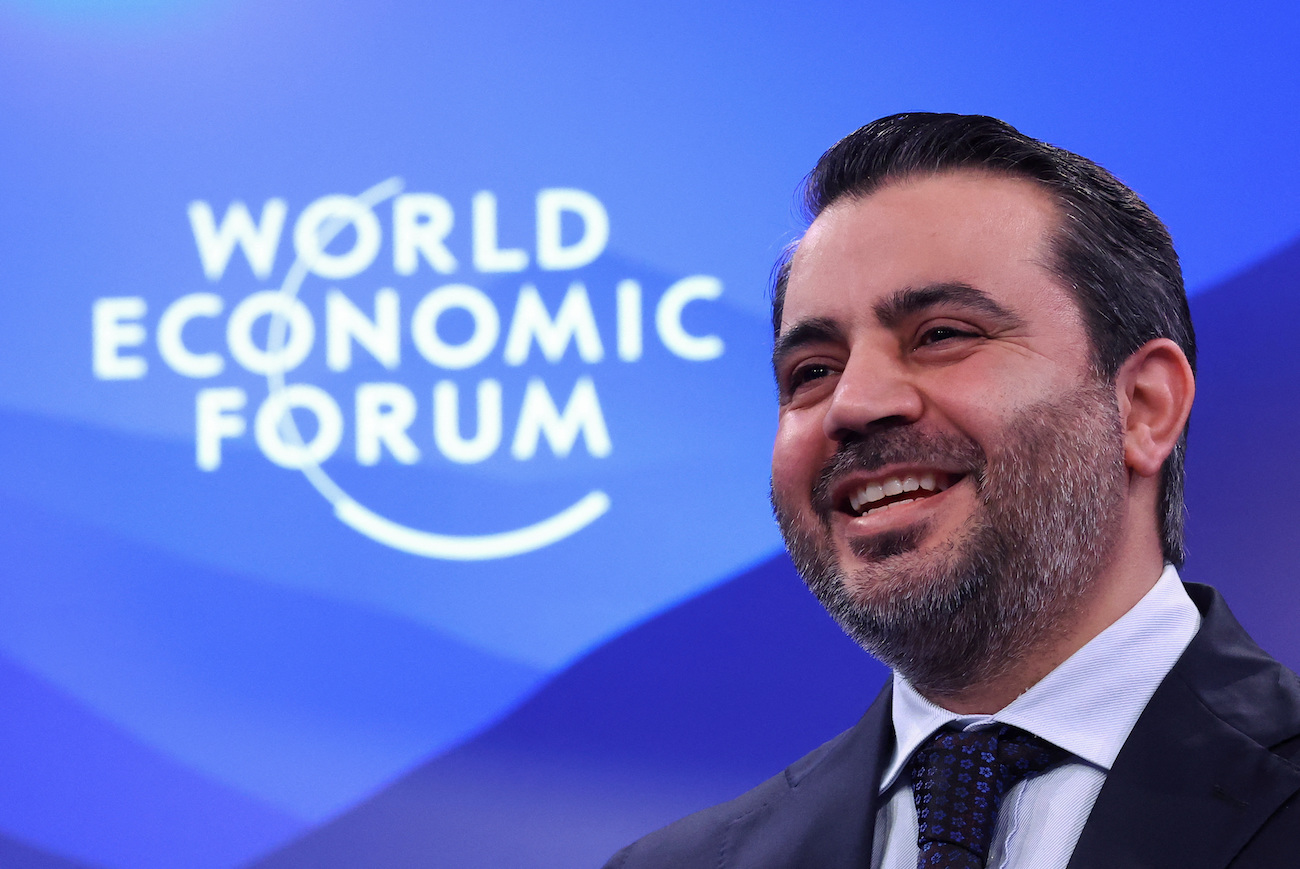
“The Syrian people shouldn’t be punished” now that the deposed ruler was no longer in power, said Al-Shaibani. “We inherited a collapsed state from the Assad regime, there is no economic system,” he added, saying he hoped “the economy in the future will be open.”
Al-Shaibani said a committee had been formed to study economic conditions and infrastructure in Syria and would focus on privatization efforts, including of oil, cotton, and factories, while exploring “public-private partnerships to encourage investment into airports, railways and roads.”
Al-Shaibani also confirmed that the country will open its economy to foreign investments, adding that Damascus was working on partnerships with Gulf states in the energy sector.
The new Syrian government has been especially keen to reach out to the Gulf states to reestablish ties, which have long suffered as a result of the Assad regime’s support for the narcotics trade.
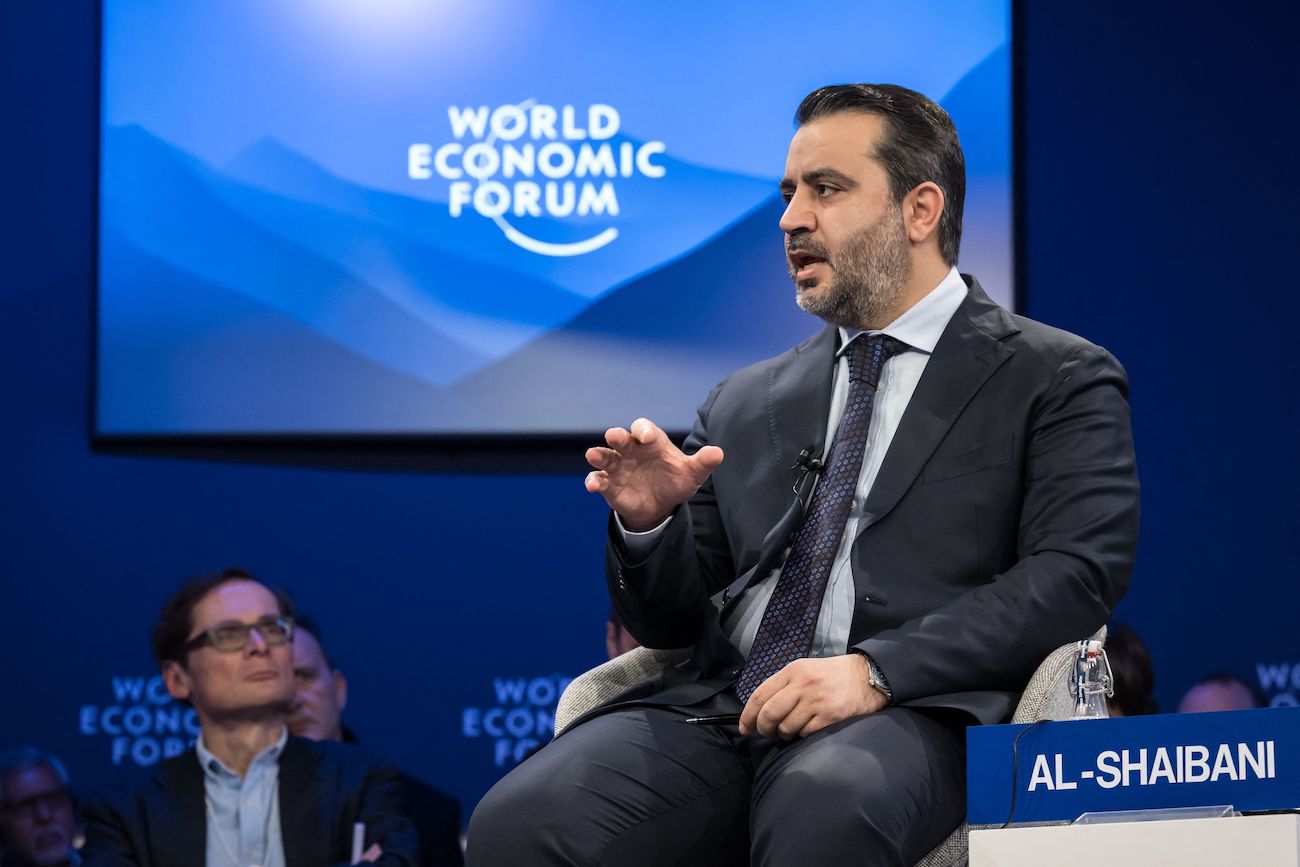
“We chose to visit the Gulf countries, because we wanted to fix the relations with these countries, where Assad had made a lot of problems for them,” Al-Shaibani said.
“(The Assad regime) used harsh language against them, exported Captagon there, these are important countries to the region. But Syria should also take its role in the region, and they can help us with that.”
Al-Shaibaani was not the only Middle Eastern voice at Davos on Wednesday. Iran’s vice-president for strategic affairs, Javad Zarif, also shared his reflections on the regional situation in the wake of Israel’s ceasefires with Hamas and Hezbollah.
Speaking to CNN’s Fareed Zakaria, Zarif said: “The resistance will stay as long as the occupation stays, as long as repression stays. Resistance to Israel, to Israeli occupation, to apartheid, to genocide, existed before the Iranian revolution.”
Zarif said Hamas still exists in Gaza and that Israeli Prime Minister Benjamin Netanyahu did not achieve his goal of destroying the Palestinian militant group during the 15-month war in the enclave.
“Hamas is still there. Israel had to come to a temporary ceasefire. I hope it will be permanent, for the sake of 50,000 people who were massacred by Israel, so that there won’t be another 50,000, but resistance is not dead,” said Zarif.
“I can tell you that the wish for the resistance to go away has been based on a misrepresentation, a framing by Israel, that this is not an Israeli-Palestinian issue, but an Israeli-Iranian issue.”
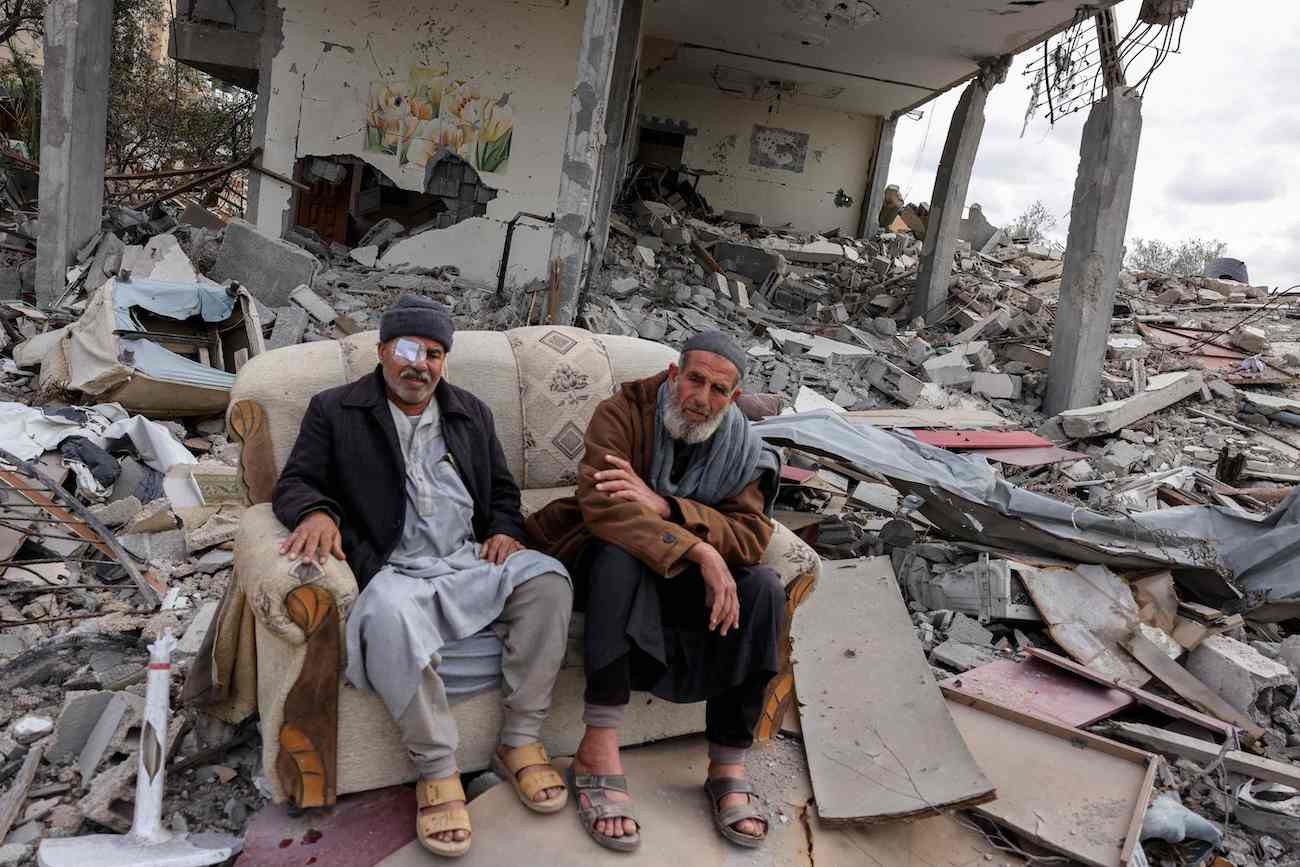
Zarif said the decades-old conflict can only be ended by resolving the Palestinian question.
“If you want to resolve the problem of Palestine, you should not look at Iran,” he said. “You should look at the Palestinian issue.
“As long as the Palestinian issue is there, the struggle will be there, the resistance will be there, and there will be support from the international community, including from Arab allies of the US.”
Speaking about US President Donald Trump, Zarif said he hoped “a ‘Trump 2’ will be more serious, more focused, more realistic” when dealing with Iran.
In 2018, during his first term, Trump withdrew from the 2015 nuclear deal negotiated by his predecessor Barack Obama, and re-imposed sanctions on Tehran as part of his “maximum pressure” policy against the regime.
Tehran responded by breaching the deal in several ways, including by accelerating its uranium enrichment program.
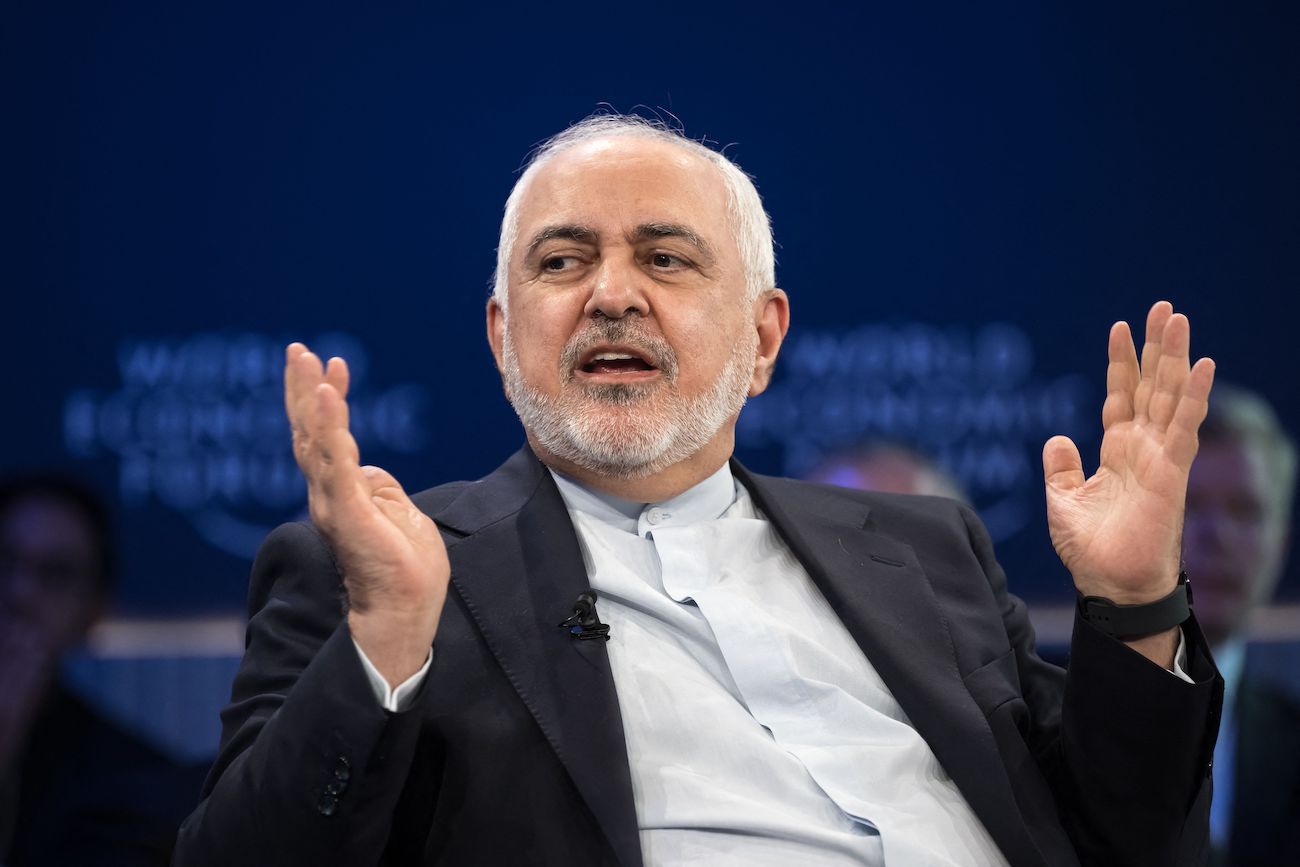
Trump has vowed to return to the policy he pursued in his previous term that sought to use economic pressure to force Iran to negotiate a deal on its nuclear program, ballistic missiles, and regional activities, including its support for proxy militias.
Zarif added that Iran has good relations with Saudi Arabia and the UAE and that he has proposed a new arrangement in the region that is based on amity.
“I have proposed in an article I recently wrote in The Economist, after my Foreign Affairs article, that we should have a new arrangement in this region,” he said.
“I call it MWADA: Muslim, West Asia Dialog Association. In Arabic, ‘mwada’ means ‘amity,’ and the title in The Economist was ‘Amity instead of enmity.’ Let’s do that.”
In his own address earlier in the day, UN Secretary-General Antonio Guterres lamented the recent rash of conflicts in the Middle East.
“We see a multiplication of conflicts, some of which are leading to a reshaping of different regions of the world — not least the Middle East,” he told the annual meeting.
He did, however, highlight recent progress, including the ceasefire deal between Israel and Hamas, which has already resulted in the exchange of several prisoners and hostages.
“There is, finally, a measure of hope when the ceasefire and hostage release deal in Gaza takes place — and we are working to surge up desperately needed humanitarian aid,” Guterres said.
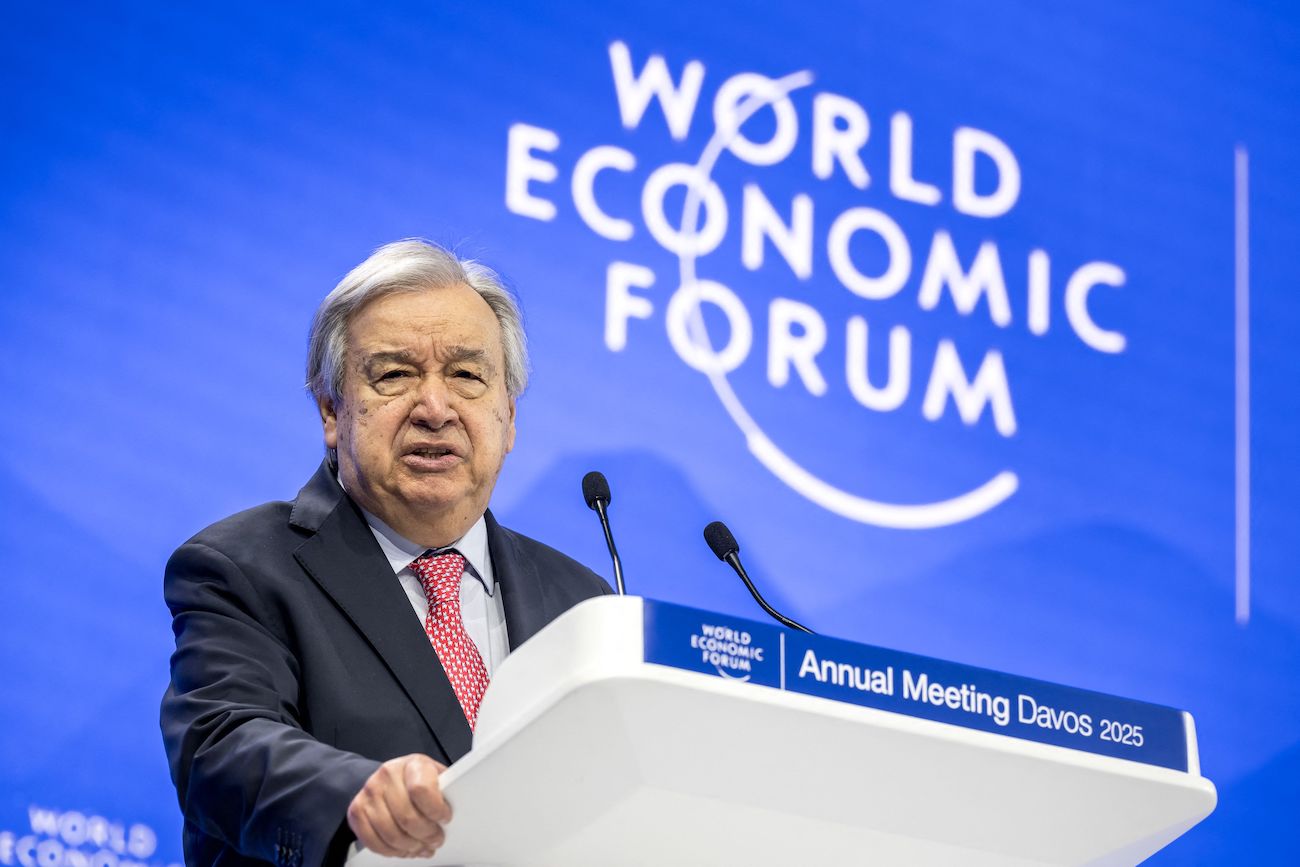
He also lauded the recent ceasefire between Israel and the Iran-backed Hezbollah militia in Lebanon and the election of a new Lebanese president and prime minister, potentially ending years of political deadlock.
“I was also just in Lebanon where a cessation of hostilities is holding, and a new government is taking shape after two years of stalemate,” he said.
In relation to Syria, Guterres said there was still a danger of further disorder unless the victorious HTS formed an inclusive administration that could work with the international community.
“We still have a strong risk of fragmentation and of extremism in at least parts of the Syrian territory,” he said.
“It is in the interest of us all to engage to make things move in the direction of an inclusive form of governance and I think some gesture must be made in relation to the sanctions.”



